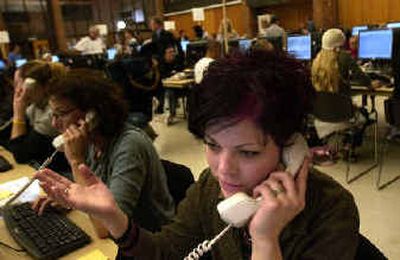EWU ground zero for returns

While the entire nation waits in anticipation for election night results, students at Eastern Washington University may be among the first to know the winners of hundreds of races throughout the country.
That’s because about 200 of them will help collect election returns at the Associated Press’ Western Election Center, located right in the middle of campus. Many of these students will stay up all night, answering thousands of calls, checking Internet sites and inputting results from more than 2,000 races in 22 states.
“It’s pretty exciting,” said Jaclyn Jaquish, a 20-year-old majoring in public relations. “This is going to be the biggest election I’ll ever be part of. I just couldn’t pass up the opportunity.”
The numbers called in to EWU – the only university in the country to serve as an AP election center – will be tabulated and sent online and via satellite to newspapers and other media across the nation and throughout the world.
In preparation for the big night, staffers from AP bureaus in Spokane, Seattle and other cities spent Saturday afternoon testing the vast network of telephones and computers while teaching the students how to collect the information via phone and Internet. Phones rang off the hook inside the multipurpose room of Eastern’s Pence Union Building, which looked like a call center with the hundreds of telephones and computer stations.
“AP Elections. What state are you calling from?” asked junior Elise Endelman, when she picked up the phone.
Stringers hired by the AP in more than 1,200 counties will be calling at least four or five times Tuesday night from various precincts with election results, including those for the presidency, Congress and the initiatives and propositions that are particular to each state. Once recorded by the students and tabulated by staff, the results will then be sent to thousands of the AP’s media members and appear on television screens, Web sites and in newspapers nationwide.
The country’s oldest and largest news organization, the AP is the only source for the national tally of the presidential race. “We – AP and Eastern – will be a critical link in the nation’s ability to know who the next president of the United States will be,” said Ann Joyce, director of the AP Data Center in Spokane.
Tuesday’s election will be the third time that the Associated Press has operated its Western Election Center at Eastern. It all began four years ago when the news organization, thanks to Joyce’s efforts, centralized its operations instead of tabulating numbers at the various AP bureaus. That first year, about 140 students answered phones and the center compiled information from 10 Western states.
Now, the AP election center gathers results from nearly two dozen states including several in the South and the Midwest. While students at the election center at EWU will get election returns for 17 states including Idaho, results for five more, including Washington, will be reported to other students working at the AP Data Center in downtown Spokane.
The first calls will come in the early afternoon after the polls close in Indiana. Among the last roundup of calls will be those from three remote precincts in Alaska’s Aleutian Islands. “We are hoping that the presidential race is decided by early Wednesday morning,” said Joyce. “We’re prepared for it not to be.”
Although Saturday was only a dress rehearsal, a buzz filled the room as avid students with small name tags stuck to their backs waited anxiously for telephones to ring. Many were journalism majors hoping to learn more about news gathering. Others are pursuing degrees in a variety of fields including education, history and science. Most wanted to get involved in the political process, they said. It’s also great way to spend election night, said one student, especially with the results posted on a giant screen and when you’re also getting $8.50 an hour.
“It’s just eye-opening to them,” said Steve Blewett, director of Eastern’s journalism program. “They come to realize how careful the process is and how important it is for journalists to get it right. … They also have a sense that they’re part of something special. People from around the world will be receiving this information from Cheney.”
Patricia Chantrill, president of the faculty senate and political communications professor, said being part of the AP Election Center has helped her students learn more about the election process, the issues that are important to various states and also the importance of every single vote.